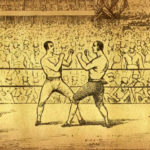We run our website the way we wished the whole internet worked: we provide high quality original content with no ads. We are funded solely by your direct support. Please consider supporting this project.

The Kingdom Stance Toward Enemies
Jesus was praying in the garden of Gethsemane, when a group of temple guards showed up to arrest him. Peter immediately drew his sword and started swinging it, cutting off a guard’s ear.
From the world’s point of view, this violence was justified. Peter was simply defending himself and his master. Yet Jesus rebuked him, reminding him that “all who draw the sword will die by the sword.” Jesus then pointed out to Peter that if he was interested in force, Jesus himself could have called on more than twelve legions of warring angels. But this, clearly, was not the kind of power Jesus was interested in employing.
Jesus then proceeded to demonstrate the kind of power he was interested in—by revealing God’s love for his aggressor and healing the man’s severed ear. Through his actions, Jesus showed that the kingdom of God relies not on the power of the sword, but the power of love that seeks to serve and heal enemies. It’s the same power he demonstrated several hours earlier when he washed the feet of his disciples.
After this, Jesus was questioned by Pilate, who asked him if he was the king of the Jews. Jesus responded, “My kingdom is not of this world.” And then he pointed to his followers’ refusal to fight as proof that his kingdom “is from another place” (John 18:36). While all the kingdoms of the world use violence to fight enemies who threaten them, Jesus commands his followers to refuse violence and serve enemies—regardless of how justified the use of violence might seem by “normal” standards.
After his encounter with Pilate, Jesus was tortured, mocked, and crucified. He had the power to avoid all this, but he chose not to use it. Why? Because he knew that using violence to protect himself, while justified by worldly standards, would not have benefited his enemies, nor would it have manifested God’s universal and unconditional love. It would not have manifested what it looks like when God reigns in someone’s life.
Had Jesus defeated his foes by asking his followers to fight for him or by calling on legions of angels, he would have manifested a high-powered version of the kingdom of the world, but he would not have manifested the kingdom of God. Had Jesus conquered his foes by force, he would have locked them into their rebellious stance against him and his Father instead of offering them the possibility of reconciliation. Had Jesus engaged in a “just war” against his foes, he would have legitimized violence rather than defeating it.
By voluntarily giving his life for his enemies—which includes you and me—Jesus made it possible for us to be transformed by the beauty of his love and to be reconciled to God. And the clearest evidence that we are being transformed by God’s love and participating in the kingdom that is not “of this world” is that we adopt the same nonviolent, self-sacrificial stance toward enemies that Jesus had.
—Adapted from The Myth of a Christian Religion, pages 94-95
Photo credit: αnnα via Visual Hunt / CC BY-NC
Category: General
Tags: Enemy Love, Kingdom of God, Love, Non-Violence, Power
Related Reading

Podcast: What are Your Thoughts on MMA Fighting and Other Violent Sports?
Greg *wrestles* through violence in sports. http://traffic.libsyn.com/askgregboyd/Episode_0373.mp3

Was Jesus Unloving Towards the Pharisees?
Some claim that Jesus spoke to religious leaders in ways that did not reflect the love of the cross. In his climatic encounter with the Pharisees in Matthew 23, Jesus’ words were undeniably harsh. He calls the Pharisees “hypocrites,” “blind guides,” “blind fools,” “snakes” and “a brood of vipers” (Mt 23:13, 15, 16,17, 19, 23,…

Why Did Jesus Command His Disciples to Arm Themselves With Swords? (podcast)
In this episode Greg looks at the command in Luke 22 to buy a sword. Episode 46 http://traffic.libsyn.com/askgregboyd/Episode_0046.mp3

Who Rules Governments? God or Satan? Part 1
Running throughout Scripture is the motif that depicts God as the ultimate ruler of the nations. On the other hand, the NT teaches that the ruler of nations is Satan. What do we do with these two apparently conflicting motifs? First, because OT authors tended to understand the creation along the lines of a king-centered…

Love Conquers All
Paul prayed in this way for the church at Ephesus: I pray that, according to the riches of his glory, [God] may grant that you may be strengthened in your inner being with power through his Spirit, and that Christ may dwell in your hearts through faith, as you are being rooted and grounded in…

How God Changes the World
God’s hopes for us began before the creation of the world. And what God intended from the beginning gives us insight into how God works to bring about what he intends. In the first chapter of Ephesians, Paul teaches that God “chose us in [Christ] before the creation of the world to be holy and…
